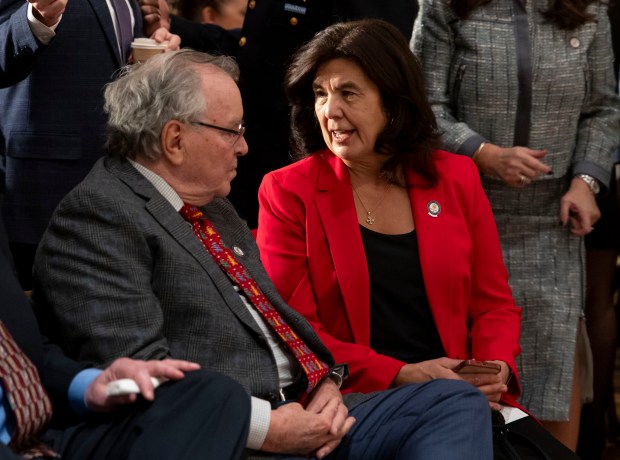Cook County State’s Attorney Eileen O’Neill Burke pledged to get “seismic things done” Monday morning as she took her oath of office in front of a bipartisan crowd, announcing a strict detention-seeking policy for some gun crimes and calling out what she said were “war zone numbers” of people shot in Chicago.
O’Neill Burke was sworn in by Illinois Supreme Court Justice Joy Cunningham in River North before a packed room that included former Mayor Richard M. Daley, former State’s Attorney Anita Alvarez, aldermen and rank-and-file prosecutors to see the first new top prosecutor in eight years. Her comments marked a tone shift from her predecessor, Kim Foxx, who was elected in 2016 amid calls for reform in the wake of the slaying of 17-year-old Laquan McDonald by Chicago police Officer Jason Van Dyke.
“We have unparalleled opportunities here. We have world-class universities, we have an infrastructure. We even have a fresh water supply. We are primed to boom,” she said. “But we are being overshadowed by crime right now.”
O’Neill Burke, who narrowly defeated her Democratic primary opponent, Clayton Harris III, and then Republican Bob Fioretti by a wider margin, comes into an office that is facing challenges such as staff morale, a strained relationship with the Chicago Police Department and the legacy of police abuse that has spawned hundreds of wrongful convictions.
Though she noted that crime has fallen in recent years since spiking at the height of the COVID-19 pandemic, she said she doesn’t want to “become numb” and referenced the recent killings of Chicago police Officer Enrique Martínez and Oak Park Detective Allan Reddins.
“Today is not about me. It is about the belief that safety and a fair criminal justice system are not mutually exclusive,” O’Neill Burke said. “We can have both and we will.”
During the program, Illinois House Speaker Emanuel “Chris” Welch, Senate President Don Harmon and Cunningham delivered remarks, calling the incoming prosecutor a “fighter” who has worked in the criminal justice system from all angles as a former prosecutor, defense lawyer, circuit court judge and appellate judge.
Welch noted both Republicans and Democrats in the crowd, shouting out a rare public appearance from Daley as well as former State’s Attorney Jack O’Malley, a Republican.
“She knows we all want to live work and thrive in safe communities and she knows we all want a justice system that works for everyone,” Welch said.
During her speech, O’Neill Burke announced a new policy for automatically seeking pretrial detention for every detainable offense with the following conditions:
- A defendant charged with a detainable felony who allegedly used or possessed a weapon with an extended magazine, drum magazine, automatic switch, or used a ghost gun or defaced firearm.
- Domestic violence, stalking or sex offenses in which the defendant is accused of possessing a weapon
- Detainable felony offenses committed on public transportation
- Murder or class X felonies
- Cases involving child pornography
- Certain sex offenses
Under Foxx, prosecutors commonly sought detention for these types of offenses, though Foxx generally spoke of reviewing cases individually rather than using an automatic policy.
O’Neill Burke’s announcement elicited a quick response from an advocacy group that was a prominent force in the elimination of cash bail in Illinois last year. In a statement sent by Matthew McLoughlin, campaign coordinator for the Illinois Network for Pretrial Justice, the network said it cautioned “against establishing blanket policies that do not allow for individual decision-making and evaluation of each specific case.”
“As the new State’s Attorney emphasizes her commitment to public safety, it is essential to remember that numerous studies have shown that pretrial jailing actually increases the likelihood that someone will be rearrested in the future,” the statement said.
According to data from Chief Judge Tim Evans’ office, Cook County prosecutors have filed detention petitions on about 18% of overall cases (a figure that includes cases not eligible for detention). Of those, judges granted the petitions in just under 60% of cases, denying pretrial detention in another 40%.
The process for seeking pretrial detention recently came under scrutiny after a Cook County judge released on electronic monitoring a defendant accused of battering his estranged wife weeks before he killed her. In that case, prosecutors did file a detention petition, but Evans’ office suggested that the judge was given incomplete information and pledged to work with O’Neill Burke to improve systems.

As state’s attorney, O’Neill Burke will inherit a pipeline of cases involving defendants seeking post-conviction relief due to allegations of brutality and coercion by Chicago police officers. Foxx, whose office overturned 250 convictions, as she was leaving office said that the Conviction Review Unit was not large enough to keep up with the pace of claims.
Protesters planned to stage a rally Monday outside of the state’s attorney’s Loop office to demand action on wrongful conviction cases, particularly though involving allegations of police torture. O’Neill Burke herself has become the subject of scrutiny on this topic during her campaign, when it was reported that she was the lead prosecutor of an 11-year-old boy whose conviction was overturned by a federal judge who ruled police coerced his confession.
O’Neill Burke did not touch on wrongful convictions in her remarks on Monday, though she attended an announcement last month by Attorney General Kwame Raoul, whose office launched a unit to investigate potential wrongful convictions.
O’Neill Burke spoke about restorative justice programs and the need to offer an alternative to incarceration for rehabilitation, though she said those programs should be reserved for non-violent offenses.
“Not only does this make us morally better as a society, but it’s fiscally better,” she said. “If we can get people turned around it costs a fraction to invest in these programs than it does to incarcerate someone.”





